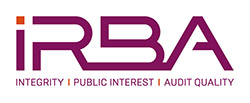33% of all audit firm rotations since 2017 due to MAFR
|
Johannesburg, Thursday, August 2, 2018 – Since the Independent Regulatory Board for Auditors (IRBA) started tracking audit firm rotations in January 2017, a total of 12% of JSE-listed companies, or 43 audit clients, have rotated their audit firms, with 33% (14) of these citing Mandatory Audit Firm Rotation (MAFR) as the reason for initiating the rotation. Termination was given as the reason for 28% (12) of the rotations, making MAFR the most cited reason for rotation. Says Bernard Agulhas, CEO of the IRBA: “We anticipated that there would be a number of early adopters following the issuing of the rule in June 2017, but we are encouraged that a third of the rotations in the last 18 months noted MAFR for the reason for early rotation. While we recognise that some of these early rotations citing MAFR may also have been driven by other concerns around KPMG, it is important to note that only five of the 14, which gave compliance with MAFR as the reason for seeking new auditors, were actually KPMG audits.” The third most cited reason was that the audit was put out to tender with 19% (8) of the rotations giving this as the primary reason for seeking a new auditor. While these companies did not specify that MAFR was a reason for rotating, at least in some of the cases it is likely that the effective date of 1 April 2023 for mandatory rotation of audit firms where tenure exceeds ten-years may have been a factor in the decision to put the audit out to tender early. During 2017, a total of 19 audits rotated, while in the first six months of 2018, this has shown growth of 26% to 24. Says Agulhas: “If this pace of growth continues into the second half of the year we could see that as many as 36 audits have rotated by year end. The UK experience of audit tendering reflected a similar growth pattern on voluntary tendering ahead of the implementation date for mandatory tendering. “Should we see a continued year on year doubling of the numbers of audits rotating, as companies pick up the pace to ensure that they get the auditor of their choice from first mover advantage, we could ultimately see as much of 74% of JSE-listed audits having rotated by 2020.” The remaining companies still to rotate at 2020 would likely be those which have until now routinely made use of several audit firms for other non-audit services. These companies must comply with cooling off provisions for conflicted auditors in terms of the Companies Act. It is therefore essential that companies which know that they will have to change auditors in 2023 have begun to address the cooling off periods for the audit firm which they may wish to engage at that time. From the UK experience, there is a significant learning curve for audit committees in this process, as few have experience of running an audit tender process. What the IRBA does caution against is audit committees which select new auditors on price alone without considering audit quality and the necessary competence and experience for the nature of the work. To assist audit committees, many of the larger audit firms have indicated that they have published, or intend to publish, Audit Firm Transparency Reports. Concludes Agulhas: “As the IRBA has indicated its intention to call for transparency reporting by audit firms, this is also very encouraging.” Ends Note to Editor: More about the IRBA: The IRBA is a public protection statutory body established to protect the financial interests of the public by ensuring registered auditors and their firms deliver services of the highest quality. It upholds audit firm independence to ensure that audit quality is such that it enhances the accuracy and credibility of financial performance reporting. In this way, the IRBA has an important role to play in building the reputation of South Africa as an investment market for both local and global investors and driving economic growth for the country. The IRBA also registers suitably qualified accountants as auditors, who must adhere to the highest ethics standards, and promotes the auditing profession through the effective regulation of assurance conducted in accordance with internationally recognised standards and processes.
|





